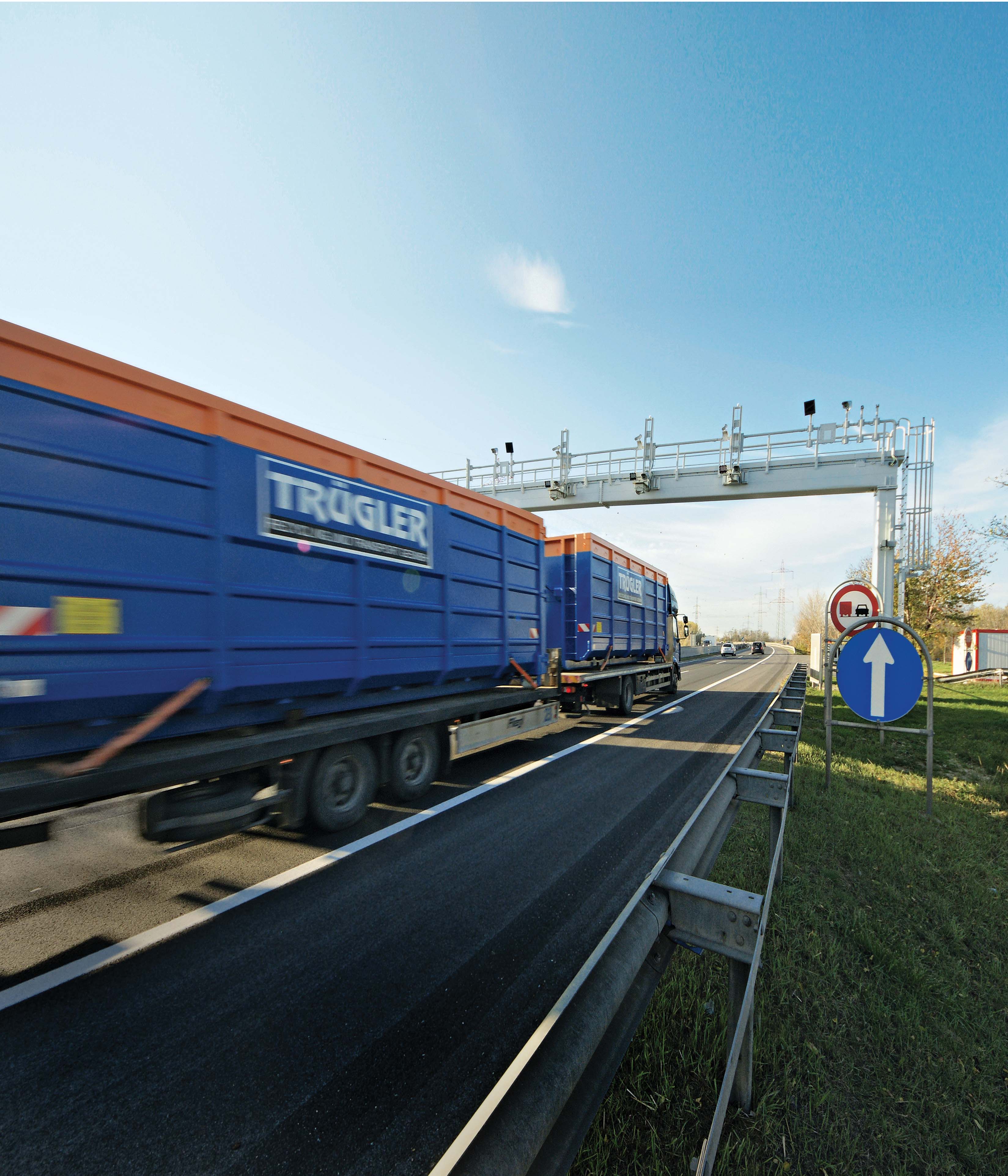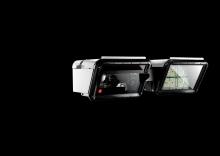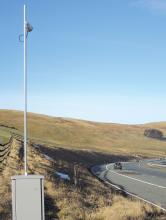New major highway tolling solution supply contracts and the launch of cutting-edge tolling products have invigorated the global tolling technology market in the first half of 2014, as Guy Woodford reports Kapsch TrafficCom has been selected by North Tarrant Express (NTE) Mobility Partners LLC to provide the toll collection, intelligent transport and network communication systems for the NTE extension project in the US state of Texas. The NTE extension is approximately 16km long, and runs along I-35W north o

Siemens’ Sitraffic Sensus on-board unit has been designed for use with all tolling technologies and can use GPS, GLONASS or GALILEO to calculate a vehicle’s position
New major highway tolling solution supply contracts and the launch of cutting-edge tolling products have invigorated the global tolling technology market in the first half of 2014, as Guy Woodford reports
259 Kapsch TrafficCom has been selected by North Tarrant Express (NTE) Mobility Partners LLC to provide the toll collection, intelligent transport and network communication systems for the NTE extension project in the US state of Texas. The NTE extension is approximately 16km long, and runs along I-35W north of the city of Fort Worth. Kapsch will deliver 10 all-electronic toll zones, including dynamic sign equipment and road sensors that provide the data to enable dynamic toll charges based upon actual traffic volumes. The Total contract value is estimated at US$26 million with the first of two segments scheduled to be operational by April 2016.
Following Kapsch’s acquisition of Transdyn in January 2014, the NTE extension will benefit from the seamless integration between the Transdyn DYNAC traffic management solution and the Kapsch Maintenance Online Management System (MOMS).
The integrated solution enables NTE to efficiently monitor the Total managed lane system to ensure optimal performance and to keep traffic flowing.
NTE Mobility Partners LLC selected Kapsch to design, build and integrate the managed lane high occupancy toll system for the first two segments of the North Tarrant Managed Lanes Systems Integration projects in the Dallas/Fort Worth Metroplex in August 2012. That project is currently underway and includes 11 toll zones and 29 tolled lanes.
“Being selected for the NTE extension project allows Kapsch to expand our managed lanes tolling solution to additional segments in the Dallas/Fort Worth region and provide an even safer, more reliable commute for more than 144,000 daily commuters,” said Chris Murray, president and CEO, Kapsch TrafficCom North America. “This award also enables Kapsch to reaffirm its commitment to the North Tarrant Expressway, where our company will complete the first two segments of the managed lanes system before the summer of 2014.”
The $2.5 billion NTE project consists of rebuilding 21.7kms along the I-820 and SH 121/183 (Airport Freeway) corridor. The five-year project, which is now approximately 80% completed, includes the reconstruction of frontage lanes and main lanes and the addition of TEXpress managed lanes throughout the corridor, which extends from I-35W in Fort Worth to Industrial Boulevard in Euless.
In Eastern Europe, the electronic tolling system implemented by Kapsch TrafficCom in Belarus in August 2013 was extended on 1 January 2014. Since launching commercially, the tolling system is said to have had an enormous impact in Belarus, with the number of registered users to early January 2014 standing at approximately 160,000. Therefore, because of the high usage, the system has been extended by 118km.
The January expansion covered a segment of the M-4 Minsk to Mogilev road. This extension means the Total length of the Kapsch operated toll roads in Belarus has increased to 933km. The expansion will mean the installation of 11 additional tolling and enforcement gantries. There will also be an additional two new customer service points opened in the Minsk region along the tolling route, both with 24/7 opening hours.
Kapsch TrafficCom received the order for the implementation and operation of a nationwide electronic toll collection system in Belarus in February 2012. The system is based on dedicated short-range communication (DSRC) and operations are scheduled for a period of 20 years.
Since the commercial launch of Electronic Tolling in summer 2013, the number of monthly transactions has risen to 169,000 in November 2013, hitting a peak of 176,000 in October 2013. The multi-national aspect also been demonstrated by the various nationalities using the System. Vehicles from Belarus, Ukraine, Lithuania, Poland and Russia have all registered for the Tolling System.
The Sitraffic Sensus Unit is2768 Siemens Mobility & Logistics (M&L) Division’s new compact on-board unit for any tolling technology.
Around a dozen different toll collection systems are currently deployed on Europe’s roads. Besides satellite-based GNSS systems, microwave-based DSRC communication is also used to identify vehicles on toll-road sections and to collect all the necessary data for toll enforcement. Siemens M&L says the the Sitraffic Sensus On-Board Unit is designed to handle all these technologies and can use GPS, Glonass or Galileo (individually or together) to calculate a vehicle's position.
The new On-Board Unit is said by Siemens M&L to not only simplify Cross-border tolling, it also supports hybrid tolling schemes that use different technologies for different classes of road. In France, Siemens M&L notes, microwave DSRC is already in use on a number of expressway sections, but current plans call for the introduction of satellite-based GNSS on other main roads and road sections. The Sitraffic Sensus Unit automatically uses its in-built technology to collect the data relevant for toll calculation, meaning no manual intervention is required by the driver who is able to focus fully on the current traffic situation.
310 Q-Free has strengthened its tolling activities in Norway by extending four of its 11 existing service agreements for the AutoPass system, while also adding two new AutoPass service agreements and increasing the scope of its existing central toll collection system work for the Norwegian Public Roads Administration. The Total combined contract value is US$4.01 million (NOK 24 million) and the contracts have a further potential of $2.5 million (NOK 15 million) over the lifetime of the projects.
“These contracts Confirm that we have an attractive portfolio offering in our home market in Norway,” said Q-Free CEO Thomas Falck.
Q-Free now has 11 Norwegian AutoPass system service and maintenance agreements. Six of these were extended in February 2014, with the company now being awarded an extension of another four.
Furthermore, the company has been awarded two new AutoPass delivery projects, in Askøy and in Hålogaland, both including service and maintenance agreements. These awards, which will take the Q-Free AutoPass system service and maintenance agreement portfolio to 13, may still be contested under the procurement procedures of the Norwegian Public Roads Administration.
The extension of the contract for operation of Norway’s central system for toll collection relates to a new installation completed in 2014.3608 EFKON highlighted its in-demand automatic toll sticker monitoring system at the recent Intertraffic 2014 show in Amsterdam.
According to EFKON, the N-Force windscreen tolling sticker label checking solution’s outstanding camera system allows the fully automatic identification of toll violators.
The high reliability in the identification of vehicles without a valid toll sticker is said to have made EFKON’s solution indispensable for the Austrian national road operator for many years.
Now though, EFKON says that due to the constant technological development of the system and high-precision image analysis, it has been possible to achieve an enormous increase in the enforcement rate. In addition to the excellent performance even under critical light and weather conditions and for vehicles travelling high speed, the ‘electronic eye’ is very portable and can change location as often as desired for effective spot checks nationwide.
“As a technology and quality leader in automatic enforcement and monitoring, we have proven our competence and are further improving,” said Bernhard Czar, sales director of EFKON, during the244 Intertraffic show. “This segment shows high market potential and we are at the beginning of our expansion and integration opportunities.
“Thanks to positive references, the automatic label checking system is also being requested beyond the country’s frontiers. We know that several European states are considering the deployment of an automatic enforcement system and are impressed by the high enforcement rates.”
EETS boosted by €2.2mn EU funds
The1116 European Union is set to co-finance with over €2.2 million from the TEN-T Programme a series of studies aiming to help realise the European Electronic Toll Services (EETS) on a Cross-border regional scale.
The studies, selected for funding under the 2012 TEN-T Multi-Annual Programme, specifically cover the electronically tolled primary road network of seven Member States (Austria, Denmark, France, Germany, Italy, Poland and Spain) Plus Switzerland (receiving no EU support). It aims to deploy EETS on the ground, taking into account the perspective of full European coverage.
Two main phases of work will be an analysis of contractual, procedural and technical topics, in order to develop recommendations and solutions that can facilitate the introduction of EETS; and the deployment of an open information platform that covers all the participating countries and a pilot demonstration of EETS compliant services covering a selection of the supporting countries
The studies will be monitored by the Innovation and Networks Executive Agency (INEA) and are set to be completed by the end of December 2015.
Following Kapsch’s acquisition of Transdyn in January 2014, the NTE extension will benefit from the seamless integration between the Transdyn DYNAC traffic management solution and the Kapsch Maintenance Online Management System (MOMS).
The integrated solution enables NTE to efficiently monitor the Total managed lane system to ensure optimal performance and to keep traffic flowing.
NTE Mobility Partners LLC selected Kapsch to design, build and integrate the managed lane high occupancy toll system for the first two segments of the North Tarrant Managed Lanes Systems Integration projects in the Dallas/Fort Worth Metroplex in August 2012. That project is currently underway and includes 11 toll zones and 29 tolled lanes.
“Being selected for the NTE extension project allows Kapsch to expand our managed lanes tolling solution to additional segments in the Dallas/Fort Worth region and provide an even safer, more reliable commute for more than 144,000 daily commuters,” said Chris Murray, president and CEO, Kapsch TrafficCom North America. “This award also enables Kapsch to reaffirm its commitment to the North Tarrant Expressway, where our company will complete the first two segments of the managed lanes system before the summer of 2014.”
The $2.5 billion NTE project consists of rebuilding 21.7kms along the I-820 and SH 121/183 (Airport Freeway) corridor. The five-year project, which is now approximately 80% completed, includes the reconstruction of frontage lanes and main lanes and the addition of TEXpress managed lanes throughout the corridor, which extends from I-35W in Fort Worth to Industrial Boulevard in Euless.
In Eastern Europe, the electronic tolling system implemented by Kapsch TrafficCom in Belarus in August 2013 was extended on 1 January 2014. Since launching commercially, the tolling system is said to have had an enormous impact in Belarus, with the number of registered users to early January 2014 standing at approximately 160,000. Therefore, because of the high usage, the system has been extended by 118km.
The January expansion covered a segment of the M-4 Minsk to Mogilev road. This extension means the Total length of the Kapsch operated toll roads in Belarus has increased to 933km. The expansion will mean the installation of 11 additional tolling and enforcement gantries. There will also be an additional two new customer service points opened in the Minsk region along the tolling route, both with 24/7 opening hours.
Kapsch TrafficCom received the order for the implementation and operation of a nationwide electronic toll collection system in Belarus in February 2012. The system is based on dedicated short-range communication (DSRC) and operations are scheduled for a period of 20 years.
Since the commercial launch of Electronic Tolling in summer 2013, the number of monthly transactions has risen to 169,000 in November 2013, hitting a peak of 176,000 in October 2013. The multi-national aspect also been demonstrated by the various nationalities using the System. Vehicles from Belarus, Ukraine, Lithuania, Poland and Russia have all registered for the Tolling System.
The Sitraffic Sensus Unit is
Around a dozen different toll collection systems are currently deployed on Europe’s roads. Besides satellite-based GNSS systems, microwave-based DSRC communication is also used to identify vehicles on toll-road sections and to collect all the necessary data for toll enforcement. Siemens M&L says the the Sitraffic Sensus On-Board Unit is designed to handle all these technologies and can use GPS, Glonass or Galileo (individually or together) to calculate a vehicle's position.
The new On-Board Unit is said by Siemens M&L to not only simplify Cross-border tolling, it also supports hybrid tolling schemes that use different technologies for different classes of road. In France, Siemens M&L notes, microwave DSRC is already in use on a number of expressway sections, but current plans call for the introduction of satellite-based GNSS on other main roads and road sections. The Sitraffic Sensus Unit automatically uses its in-built technology to collect the data relevant for toll calculation, meaning no manual intervention is required by the driver who is able to focus fully on the current traffic situation.
“These contracts Confirm that we have an attractive portfolio offering in our home market in Norway,” said Q-Free CEO Thomas Falck.
Q-Free now has 11 Norwegian AutoPass system service and maintenance agreements. Six of these were extended in February 2014, with the company now being awarded an extension of another four.
Furthermore, the company has been awarded two new AutoPass delivery projects, in Askøy and in Hålogaland, both including service and maintenance agreements. These awards, which will take the Q-Free AutoPass system service and maintenance agreement portfolio to 13, may still be contested under the procurement procedures of the Norwegian Public Roads Administration.
The extension of the contract for operation of Norway’s central system for toll collection relates to a new installation completed in 2014.
According to EFKON, the N-Force windscreen tolling sticker label checking solution’s outstanding camera system allows the fully automatic identification of toll violators.
The high reliability in the identification of vehicles without a valid toll sticker is said to have made EFKON’s solution indispensable for the Austrian national road operator for many years.
Now though, EFKON says that due to the constant technological development of the system and high-precision image analysis, it has been possible to achieve an enormous increase in the enforcement rate. In addition to the excellent performance even under critical light and weather conditions and for vehicles travelling high speed, the ‘electronic eye’ is very portable and can change location as often as desired for effective spot checks nationwide.
“As a technology and quality leader in automatic enforcement and monitoring, we have proven our competence and are further improving,” said Bernhard Czar, sales director of EFKON, during the
“Thanks to positive references, the automatic label checking system is also being requested beyond the country’s frontiers. We know that several European states are considering the deployment of an automatic enforcement system and are impressed by the high enforcement rates.”
EETS boosted by €2.2mn EU funds
The
The studies, selected for funding under the 2012 TEN-T Multi-Annual Programme, specifically cover the electronically tolled primary road network of seven Member States (Austria, Denmark, France, Germany, Italy, Poland and Spain) Plus Switzerland (receiving no EU support). It aims to deploy EETS on the ground, taking into account the perspective of full European coverage.
Two main phases of work will be an analysis of contractual, procedural and technical topics, in order to develop recommendations and solutions that can facilitate the introduction of EETS; and the deployment of an open information platform that covers all the participating countries and a pilot demonstration of EETS compliant services covering a selection of the supporting countries
The studies will be monitored by the Innovation and Networks Executive Agency (INEA) and are set to be completed by the end of December 2015.








